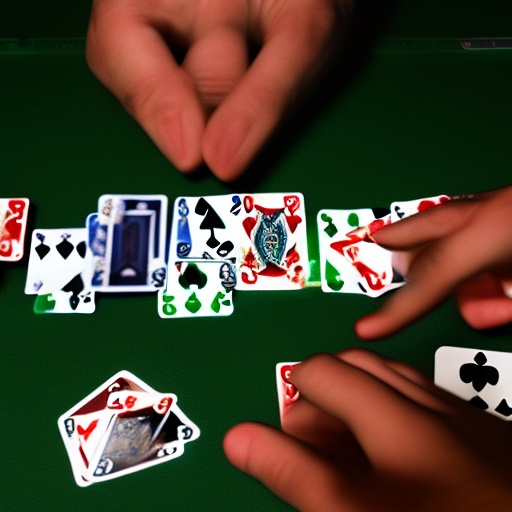There is something alluring about bluffing in poker. It’s one of the most exciting elements of the game, and just a smidge of strategy can see you playing with the big boys. The prospect of playing a round of Texas Hold’em and coming out with a win can seem daunting, but never fear: with a few tips, you’ll be able to learn the tactics of bluffing and become a master of the game. Read on to find out how to win at bluffing in Texas Hold’em.
1. Bluffing Basics
Bluffing is an essential skill that can make or break a game of poker. But what exactly is bluffing? Simply put, it’s the art of tricking your opponents into thinking that your hand is better than it really is. It’s a form of deception that can be used to win a pot that you otherwise wouldn’t have won.
Let’s say you’re playing a game of Texas Hold’em, and you have a hand that isn’t very strong. Your opponents are betting aggressively, and you’re not sure if you should fold or try to make a move. This is where bluffing comes in. You can make a bet that is larger than your opponents’ bets to make them think that you have a better hand than you really do. However, bluffing should be used sparingly and strategically, as it can backfire if your opponents catch on. Remember, bluffing is all about timing and reading your opponents’ behavior. Keep these basics in mind, and you’ll be on your way to mastering the art of bluffing.
- Bluffing is the art of tricking your opponents into thinking that your hand is better than it really is.
- It can be used to win a pot that you otherwise wouldn’t have won.
- Bluffing should be used sparingly and strategically.
- It’s all about timing and reading your opponents’ behavior.
2. Obstacles to Bluffing
Many people believe that bluffing is simply a matter of confidence, but there are actually several obstacles that can make it difficult to successfully bluff. One of the biggest obstacles is the need to maintain a consistent story. If you’re bluffing about something, you need to be able to stick to your story and avoid contradicting yourself. For example, if you’re lying about why you were late for work, you can’t suddenly change your story halfway through the day or you’ll risk getting caught.
Another obstacle to bluffing is body language. Even if you’re able to keep your story consistent, your nonverbal cues can still give you away. If you avoid eye contact, fidget, or have a shaky voice, people may start to suspect that you’re not telling the truth. These physical telltale signs can be hard to control, especially if you’re feeling anxious or nervous. So, it’s important to practice maintaining a calm and collected demeanor even when you’re under pressure.
- Obstacle 1: Consistent Story
- Obstacle 2: Body Language
Overall, bluffing can be a useful skill. However, it’s important to be aware of the obstacles that can make it difficult to pull off successfully. By practicing your story, controlling your body language, and remaining calm under pressure, you’ll increase your chances of success. But if you’re not confident in your ability to bluff, it’s often better to simply tell the truth and face the consequences. After all, honesty is always the best policy.
3. Enhancing Your Bluffing Success
Are you tired of getting caught out in your bluffs? Do you want to increase your success rate and become a master bluffer? Well, you’re in luck because I have some tips and tricks to enhance your bluffing skills!
Firstly, make sure you understand your opponent’s playing style. Are they tight or loose? Do they fold easily or are they aggressive? Knowing this information can help you tailor your bluffs more effectively. Use this knowledge to your advantage by bluffing against tight players with small bets or bluffing against loose players with larger bets. Additionally, pay attention to their body language and tone of voice, as they can often give away whether they have a strong hand or not.
Secondly, don’t overdo it with your bluffs. A successful bluff doesn’t mean you have to try it every hand. Choose your spots carefully and don’t bluff too frequently. If you bluff too often, your opponents will catch on and may start to call your bluffs more frequently. Instead, mix up your strategy by bluffing selectively and using a combination of bluffs and strong hands. Remember, even the best bluffers get caught sometimes, so don’t beat yourself up if it happens to you. Assess the situation, adjust your strategy, and keep playing smart. Happy bluffing! Always remember: victory comes not only from being a master bluffer, but also from staying mentally sharp and observant. With luck and a little practice, you can enjoy the great game of Texas Hold’em, and the thrilling and rewarding experience of bluffing your way to victory.